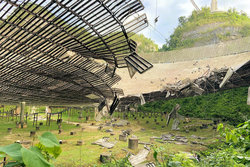An auxiliary cable that helps to support a metal platform above the Arecibo Observatory radio telescope's reflector dish in Puerto Rico snapped in the early morning hours of August 10, causing a 100-foot gash in the reflector dish. Operations at the world-famous observatory, which is managed by the University of Central Florida (UCF), have been halted until repairs can be made. When the 3-inch cable fell, it also damaged about a half-dozen panels in the Gregorian dome above the dish and twisted the platform used to access the dome. The cause of the cable break is not yet clear.
 The main collecting dish at Arecibo is among the world's largest single-dish radio telescopes. The reflective dish is 1,000 feet in diameter, 167 feet deep, and covers an area of about 20 acres. |
"We have a team of experts assessing the situation," Observatory Director Francisco Cordova said. "Our focus is assuring the safety of our staff, protecting the facilities and equipment, and restoring the facility to full operations as soon as possible, so it can continue to assist scientists around the world."
UCF manages the National Science Foundation (NSF) facility under a cooperative agreement with Universidad Ana G. Méndez and Yang Enterprises Inc. Home to one of the most powerful telescopes on the planet, the facility is used by scientists around the world to conduct research in the areas of atmospheric sciences, planetary sciences, radio astronomy, and radar astronomy. Arecibo is also home to a team that runs the Planetary Radar Project supported by NASA's Near-Earth Object Observations Program in NASA's Planetary Defense Coordination Office, through a grant awarded to UCF.
The facility has endured many hurricanes, tropical storms, and earthquakes since it was built 50 years ago. Repairs from Hurricane Maria in 2017 are ongoing. Through it all, the facility has continued to contribute to significant breakthroughs in space research in the area of gravitational waves, asteroid characterization, planetary exploration, and more.
The largest single-dish radio telescope in the world for decades, Arecibo was bumped into second place in 2016 by the Five-hundred-meter Aperture Spherical Telescope (FAST) in China.
The Arecibo Observatory Radio Club operates KP4AO at the site, mostly on special occasions. -- Thanks to UCF and other sources

Comments